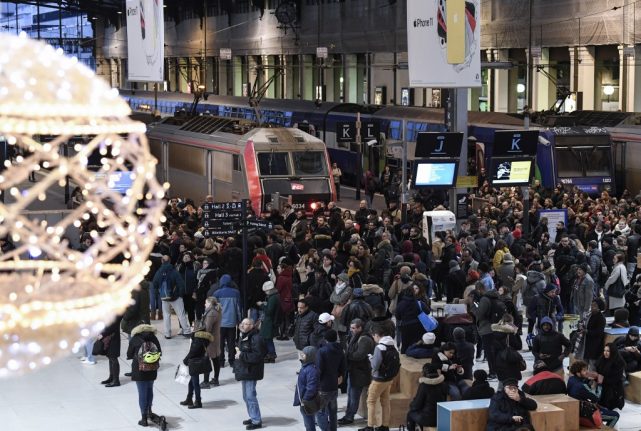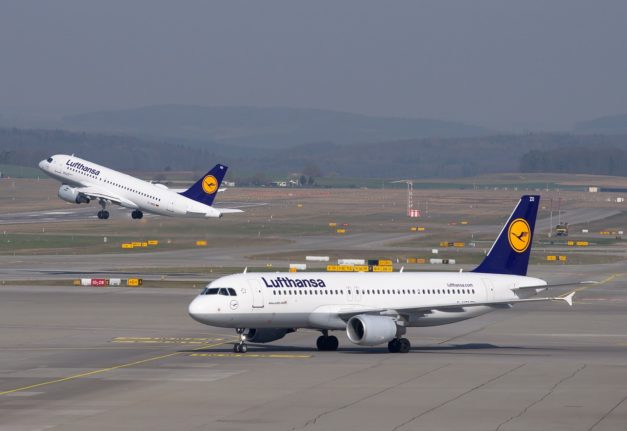French schools mostly break up on Friday, December 20th, and many families had been planning to make their Christmas getaway by rail over the weekend to see family over the holidays – 1.7 million people had booked tickets in advance.
But rail operator SNCF has now confirmed that services for the first weekend of the holidays will be badly disrupted – with only half the usual high speed TGV trains running.
The rail operator hopes to offer all of the usual services on the budget Ouigo line, but has also confirmed that its 'Junior et compagnie' service for unaccompanied children has been cancelled.
Because signal workers are on strike, the disruption also affects any trains that travel on French railways, including Eurostar – which is running a limited service – and international operators like Lyria and Thalys which are running limited services between France and Switzerland, Belgium and the Netherlands. Eurotunnel's Le Shuttle services are not affected.
READ ALSO When do the 2019 Christmas holidays begin in France?

The train services that are running are generally very crowded. Photo: AFP
Could the strikes end before Christmas?
Obviously the way to ensure that all services are running as normal is for the strikes to be called off altogether. And while that is still possible, at the moment it is not looking very likely.
The French government last week unveiled full details of its planned reform of the country's pension system – which includes a universal system for everyone, the end of 'special regimes' that allow people to retire early, better compensation for women who take time out of the workplace to have children and a minimum monthly pension of €1,000 a month.
But unions fear the changes will see many workers losing out on their pension pots.
They are also concerned about the introduction of a 'pivot age'. Although the legal retirement age in France would remain at 62, the government wants to introduce a 'pivot age' of 64 when the full pension kicks in. So people could still retire at 62, but would get a smaller pension than their colleague who worked for another two years.
READ ALSO What you need to know about the proposed French pension reform
So is there any hope of compromise?
Well, some. France's largest union, the more moderate CFDT has said it is not opposed in principle to pension reform, just the pivot age.
In a tacit acceptance that a full breakthrough is now unlikely before the holidays, the conversation in France turned to whether unions might agree to a trêve de Noël (Christmas truce).
This has the advantage of securing public goodwill by making sure people's Christmas holidays are not disrupted, and for striking workers could mean a vital bit of extra cash in their pockets before resuming strike action in January.
However, on Tuesday this was ruled out in a joint union statement, with SNCF confirming that services would again be badly disrupted on the weekend of December 21st and 22nd and afterwards.
The operator said it would be able to run half its usual service on the high speed TGV network over the weekend, transporting 850,000 people – just half of those who had booked tickets.
For the budget InOui service there was better news, with most services expected to run.
During the strike period SNCF is publishing detailed timetables on its website at 5pm for the following day's travel.
Rail unions protesting over reforms to labour laws staged a series of intermittent strikes in 2018, which ended generally in defeat as the Macron government pushed its reforms though, so it may be that they lesson some have taken from that is that only all-out strikes are effective.
The CGT union, which is among the most hardline of the French unions, has been blunt on the subject.
“No truce for Christmas, unless the government comes to its senses before that,” warned Laurent Brun, general secretary of the union's railway branch.
Sud-Rail union is also taking a firm line. Fabien Dumas, the organisation's federal secretary, told French media that discussion among members is now already focused on “the end of the year” for strike action and they are looking to amplify their movement.
Between them the CGT-Cheminots and Sud-Rail unions represent around 60 percent of train drivers, so they are the key unions here.

If there is no truce, will services get better or worse as time goes on?
The other factor that needs to be considered is how many drivers will stay out if the strike action continues over Christmas and hits the one-month mark on January 5th.
French workers are not paid during strikes, although unions often run a cagnotte (collection pot) for donations that are passed on to striking workers.
READ ALSO Striking in France – what are the rules and do workers get paid?
So if strikes continue for a long time many workers – unable to take the financial hit – gradually return to work.
On the first day of the strike action, 85.7 percent of train drivers were on strike. By one week later that had fallen to 71.6 percent, and by December 13th it was 66.8 percent and SNCF was able to run about 20 percent of its normal timetable, as opposed to just 10 percent on the first day of the strike.
Another week of strikes would likely see more drivers returning to work, meaning that even without a break there could be a slight expansion in services.
What do the public think?
Unions may be hoping for a repeat of 1995 – after three weeks of strikes paralysed the country, and with Christmas looming, Jacques Chirac's government capitulated and dropped its proposed pension reforms.
Le Parisien deciding to bypass the government and the unions and asking Father Christmas to make the trains run . . . pic.twitter.com/Y8sYhJ7aR1
— Emma Pearson (@LocalFR_Emma) December 14, 2019



 Please whitelist us to continue reading.
Please whitelist us to continue reading.
InOui is the new branding for regular TGVs. The budget TGVs are OuiGo.